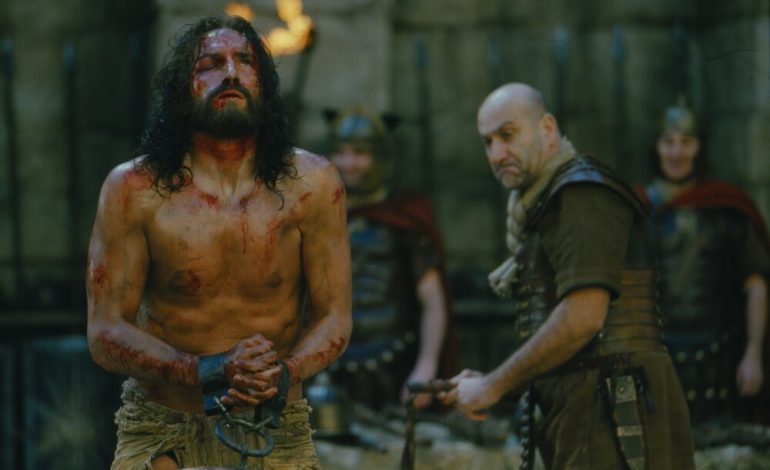Top 5 Easter Movies About Death And Resurrection Of Jesus


Easter, a significant religious holiday for Christians worldwide, commemorates the death and resurrection of Jesus Christ.
While the religious observance entails solemn rituals and spiritual reflection, popular culture has also embraced the theme through various mediums, including film.
In this piece, we delve into the realm of cinema to explore five compelling Easter movies that portray the narrative of Jesus’s death and resurrection.
1. The Passion of the Christ” (2004)
The Passion of the Christ” (2004), directed by Mel Gibson, stands as a cinematic landmark in its portrayal of the final hours of Jesus’s life. Gibson’s film offers a visceral and unflinching depiction of the events leading up to Jesus’s crucifixion and subsequent resurrection, presenting viewers with a raw and emotionally charged narrative.
Through striking visuals and intense performances, the film immerses audiences in the profound suffering endured by Jesus as he faces betrayal, condemnation, and ultimately, crucifixion.
At the heart of “The Passion of the Christ” is its unwavering focus on the physical and emotional agony experienced by Jesus during his ordeal. Gibson’s unrelenting portrayal of the brutality inflicted upon Jesus has been both praised for its authenticity and criticized for its graphic nature.
Nevertheless, the film’s commitment to depicting the reality of Jesus’s suffering serves to underscore the depth of his sacrifice and the magnitude of his love for humanity.
In addition to its portrayal of Jesus’s suffering, “The Passion of the Christ” also explores themes of faith, redemption, and forgiveness. Through moments of reflection and spiritual contemplation, the film invites viewers to contemplate the significance of Jesus’s sacrifice and the profound implications of his resurrection. In doing so, it prompts audiences to confront their own beliefs and confrontations with the divine.
Gibson’s film has sparked discussions and debates about its interpretation of biblical events, as well as its portrayal of historical and theological themes. While some have praised the film for its unapologetic fidelity to the biblical narrative, others have raised concerns about its depiction of violence and its potential to perpetuate harmful stereotypes.
Nevertheless, “The Passion of the Christ” remains a powerful and enduring cinematic portrayal of the Easter story, continuing to resonate with audiences around the world.
In conclusion, “The Passion of the Christ” stands as a bold and impactful exploration of the final hours of Jesus’s life, offering viewers a visceral and unflinching portrayal of his crucifixion and resurrection. Through its intense imagery, emotional depth, and thematic resonance, the film invites audiences to engage with the profound significance of Jesus’s sacrifice and the transformative power of his resurrection.
2. Ben-Hur” (1959)
“Ben-Hur” (1959), directed by William Wyler, is an epic cinematic masterpiece that transcends its genre to become a timeless exploration of faith, redemption, and forgiveness. At its core, the film tells the story of Judah Ben-Hur, a Jewish prince whose life intersects with that of Jesus Christ, leading to a transformative journey that culminates in the crucifixion. Wyler’s direction masterfully weaves together spectacle, drama, and spiritual themes to create a narrative that resonates deeply with audiences.
Central to “Ben-Hur” is the character of Judah Ben-Hur, portrayed with nuance and depth by Charlton Heston. As the film unfolds, Judah experiences a series of trials and tribulations that test his faith and resilience. His encounter with Jesus, portrayed with quiet dignity by Claude Heater, serves as a catalyst for his spiritual awakening, prompting him to confront his own beliefs and prejudices.
The crucifixion scene in “Ben-Hur” is a pivotal moment in the film, showcasing Wyler’s skillful direction and Heston’s powerful performance. As Judah witnesses the crucifixion of Jesus, he is overcome with a profound sense of empathy and compassion, leading to a moment of spiritual revelation. Through this transformative experience, Judah undergoes a profound inner change, ultimately finding redemption and forgiveness.
In addition to its exploration of faith and redemption, “Ben-Hur” is renowned for its epic scale and grand spectacle. The film’s iconic chariot race sequence, choreographed with precision and intensity, remains one of the most memorable scenes in cinematic history.
However, it is the film’s underlying themes of love, sacrifice, and reconciliation that elevate it beyond mere spectacle, resonating with audiences on a deeper emotional level.
“Ben-Hur” endures as a cinematic classic not only for its technical achievements but also for its timeless themes and powerful storytelling. Wyler’s direction, coupled with Heston’s commanding performance, creates a cinematic experience that continues to captivate and inspire audiences, reminding them of the enduring power of faith and the possibility of redemption.
3. Risen” (2016)
“Risen” (2016), directed by Kevin Reynolds, offers a unique and compelling perspective on the events surrounding the crucifixion and resurrection of Jesus Christ. Set in the tumultuous aftermath of Jesus’s crucifixion, the film follows Clavius, a Roman tribune played by Joseph Fiennes, as he investigates the disappearance of Jesus’s body. Blending historical fiction with biblical narrative, “Risen” provides viewers with a fresh interpretation of the Easter story, exploring themes of faith, doubt, and redemption.
At the heart of “Risen” is Clavius’s journey of discovery and transformation. As a seasoned Roman soldier, Clavius initially approaches his task with skepticism and cynicism, viewing the events surrounding Jesus’s death as merely political intrigue. However, as he delves deeper into the mystery of the missing body, Clavius’s encounters with Jesus’s followers and witnesses force him to confront his own beliefs and assumptions, ultimately leading to a profound spiritual awakening.
The film’s portrayal of Clavius’s investigation is both suspenseful and thought-provoking, as he navigates through a landscape of political intrigue, religious fervor, and personal conflict.
Reynolds skillfully balances the historical and biblical elements of the story, creating a narrative that feels authentic and immersive.
Through Clavius’s eyes, viewers are given a window into the tumultuous world of first-century Judea, where faith and doubt collide amidst the backdrop of Roman occupation.
“Risen” also excels in its portrayal of Jesus Christ, portrayed with warmth and authenticity by Cliff Curtis. Rather than relegating Jesus to the periphery of the story, the film presents him as a central figure whose presence looms large over every scene. Curtis’s portrayal captures the compassion, wisdom, and divine nature of Jesus, inviting viewers to experience his teachings and miracles through Clavius’s eyes.
In conclusion, “Risen” is a compelling and thought-provoking exploration of the Easter story, offering viewers a fresh perspective on the crucifixion and resurrection of Jesus Christ. Through its blend of historical fiction and biblical narrative, the film invites audiences to journey alongside Clavius as he grapples with questions of faith, doubt, and redemption. Reynolds’s direction, coupled with strong performances from the cast, creates a cinematic experience that is both engaging and spiritually resonant.
4. The Gospel of John” (2003)
“The Gospel of John” (2003), directed by Philip Saville, stands as a faithful and reverent adaptation of the biblical Gospel, offering viewers a comprehensive retelling of the life, death, and resurrection of Jesus Christ. Through meticulous attention to detail and a commitment to authenticity, Saville’s film transports audiences back to the time of Jesus, inviting them to experience the events of the Gospel of John in a deeply immersive and cinematic way.
One of the defining characteristics of “The Gospel of John” is its adherence to the source material. Drawing directly from the text of the Gospel itself, the film presents Jesus’s teachings, miracles, and interactions with remarkable fidelity. From the opening verses proclaiming Jesus as the Word made flesh to the climactic scenes of his crucifixion and resurrection, Saville’s adaptation remains true to the spirit and message of the biblical narrative.
In addition to its faithfulness to the Gospel, “The Gospel of John” also distinguishes itself through its reverent tone and atmosphere.
Through evocative cinematography, haunting musical score, and powerful performances from the cast, the film creates a sense of reverence and awe that captures the profound significance of Jesus’s life and ministry.
Viewers are invited to immerse themselves in the world of first-century Judea and witness the transformative impact of Jesus’s teachings.
Saville’s film is not merely a retelling of familiar stories; it is also a meditation on the deeper themes and messages contained within the Gospel of John. Through its portrayal of Jesus’s interactions with individuals from all walks of life, the film explores timeless themes of love, compassion, forgiveness, and redemption. Whether Jesus is engaging in dialogue with Nicodemus, healing the blind man, or sharing the Last Supper with his disciples, each scene offers insights into the nature of God’s love and the transformative power of faith.
In conclusion, “The Gospel of John” is a reverent and compelling cinematic adaptation of the biblical Gospel, offering viewers a comprehensive and immersive retelling of the life, death, and resurrection of Jesus Christ. Through its faithful adherence to the source material, its evocative atmosphere, and its exploration of timeless themes, the film provides audiences with a deeply moving and spiritually enriching experience.
5. Jesus Christ Superstar” (1973)
“Jesus Christ Superstar” (1973), directed by Norman Jewison, is a groundbreaking musical film that reimagines the final days of Jesus Christ through a contemporary lens. Based on the rock opera by Andrew Lloyd Webber and Tim Rice, the film infuses the narrative with vibrant music and theatricality, offering viewers a fresh and dynamic interpretation of the Easter story. Through its innovative approach, “Jesus Christ Superstar” explores timeless themes of faith, betrayal, and the complexities of human nature.
At the heart of “Jesus Christ Superstar” is its electrifying musical score, composed by Andrew Lloyd Webber and featuring lyrics by Tim Rice. From the opening strains of “Heaven on Their Minds” to the climactic finale, the film’s soundtrack propels the narrative forward with energy and emotion. By setting the story to rock and roll rhythms, Jewison creates a sense of immediacy and relevance that resonates with audiences, inviting them to engage with the characters and themes on a visceral level.
In addition to its memorable music, “Jesus Christ Superstar” distinguishes itself through its bold and unconventional visual style. Filmed on location in Israel, the film’s stunning landscapes and architectural backdrops provide a dramatic backdrop for the story’s unfolding events.
Jewison’s use of innovative camera techniques and editing strategies further enhances the film’s visual impact, creating a sense of intimacy and immediacy that draws viewers into the story.
“Jesus Christ Superstar” also explores complex theological and philosophical themes, challenging traditional interpretations of the Easter story. Through its portrayal of Jesus as a conflicted and humanized figure, the film raises questions about the nature of divinity, the meaning of sacrifice, and the role of faith in the face of adversity. By presenting Jesus’s final days from multiple perspectives, including those of his disciples and detractors, the film invites viewers to grapple with the complexities of his character and message.
In conclusion, “Jesus Christ Superstar” is a groundbreaking musical film that offers a fresh and provocative interpretation of the Easter story. Through its vibrant music, innovative visual style, and exploration of complex themes, the film continues to captivate audiences and provoke thought decades after its release. Directed by Norman Jewison with passion and creativity, “Jesus Christ Superstar” remains a timeless and influential work of cinematic art.


Sodiq Lawal is a passionate and dedicated journalist with a knack for uncovering captivating stories in the bustling metropolis of Osun State and Nigeria at large. He has a versatile reporting style, covering a wide range of topics, from politics , campus, and social issues to arts and culture, seeking impact in all facets of the society.










